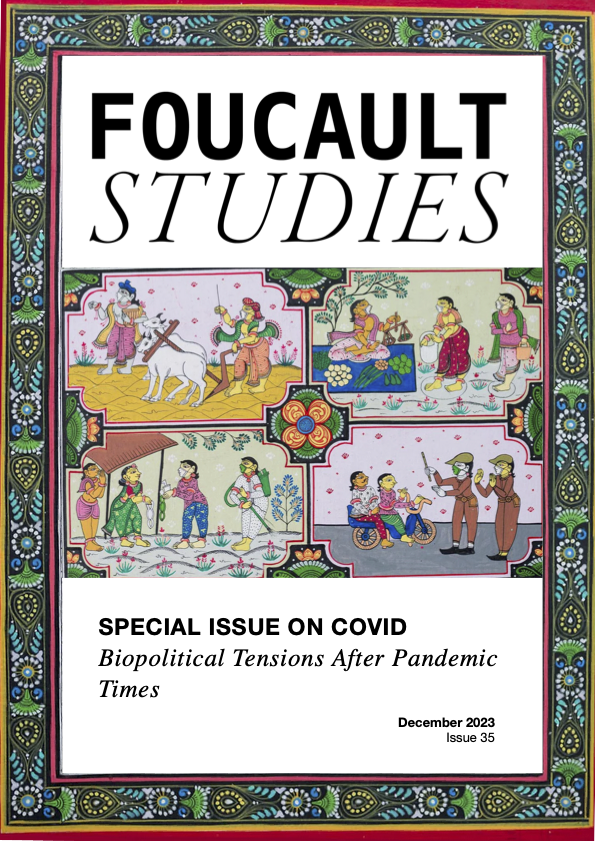Post-pandemic South Asian Governmentalities and Foucault: State Power and Ordinary Citizens
DOI:
https://doi.org/10.22439/fs.i35.7084Abstract
As the post-COVID world order necessitates a radical overhaul of the ways in which we understand the very notions of “health”, “care” and “security”, one must revisit Michel Foucault and his works in these shifting times to rethink biopolitics as a category viz-a-viz contemporary globalectics. Keeping that in mind, while reviewing two very interesting books by and on Foucault – South Asian Governmentalities: Michel Foucault and the Question of Postcolonial Orderings and Archives of Infamy: Foucault on State Power in the Lives of Ordinary Citizens – the article attempts to highlight certain core Foucauldian concerns in different domains of human existence that the...
References
Bhattaarjee, Malini, “Building a ‘Hindu Rashtra’ through ‘seva’,” Economic and Politi-cal Weekly 56/3 (2021). https://www.epw.in/engage/article/building-hindu-rashtra-through-seva
Clarance, Andrew, “Aarogya Setu: Why India’s Covid-19 contact tracing app is con-troversial,” BBC News (2023). https://www.bbc.com/news/world-asia-india-52659520
Dhillon, Amrit, “Indian supreme court orders inquiry into state’s use of Pegasus spyware,” The Guardian (2023). https://www.theguardian.com/news/2021/oct/27/indian-supreme-court-orders-inquiry-into-states-use-of-pegasus-spyware
HK, Varun, “SC’s Aadhaar verdict| Privacy vs Identity,” Deccan Herald (2023). https://www.deccanherald.com/national/aadhaar-act-verdict-history-693614.html
Legg, Stephen, and Deana Heath, South Asian Governmentalities: Michel Foucault and the Question of Postcolonial Orderings. Cambridge: Cambridge University Press, 2018.
Luxon, Nancy. Archives of Infamy: Foucault on State Power in the Lives of Ordinary Citi-zens. Minneapolis/London: University of Minnesota Press, 2019.
Pandey, Geeta, “Coronavirus in India: Desperate migrant workers trapped in lock-down,” BBC (2023). https://www.bbc.com/news/world-asia-india-52360757
Perrigo, Billy, “It Was Already Dangerous to Be Muslim in India. Then Came the Coronavirus,” Time (2023). https://time.com/5815264/coronavirus-india-islamophobia-coronajihad/
Standing, Guy, The Precariat: The New Dangerous Class. London, New Delhi, New York, Sydney: Bloomsbury Academic, 2011.
Zizek, Slavoj, Pandemic! Covid-19 Shakes the World. Cambridge: Polity Books, 2020.
Downloads
Published
How to Cite
Issue
Section
License
Copyright (c) 2023 The Author

This work is licensed under a Creative Commons Attribution-NonCommercial-NoDerivatives 4.0 International License.
Authors retain copyright to their work, but assign the right of the first publication to Foucault Studies. The work is subject to a CC BY-NC-ND 4.0 license, but despite these restrictions, authors can take for granted that Foucault Studies will permit articles published in Foucault Studies to be translated or reprinted in another format such as a book providing a full reference is made to Foucault Studies as the original place of publication.



